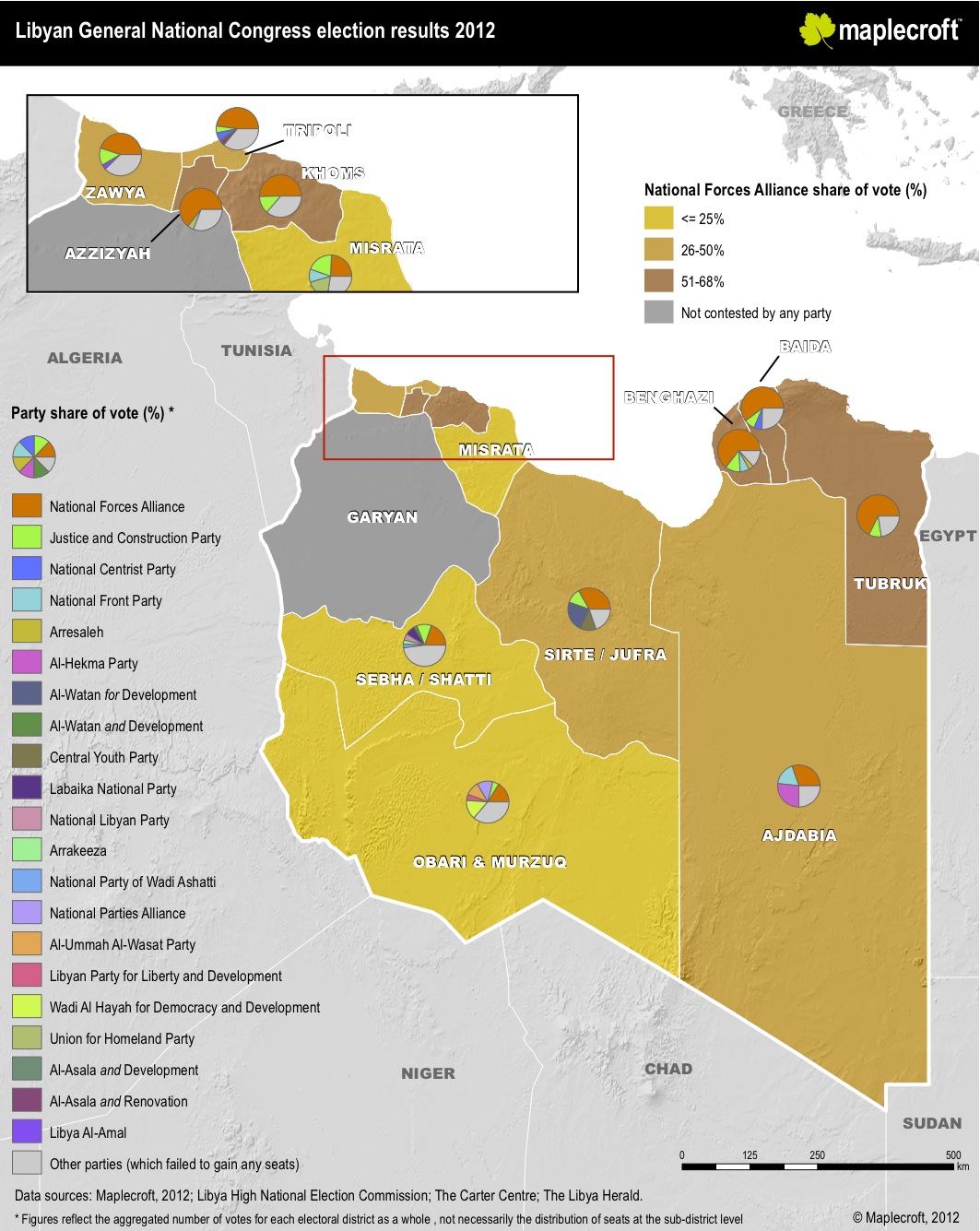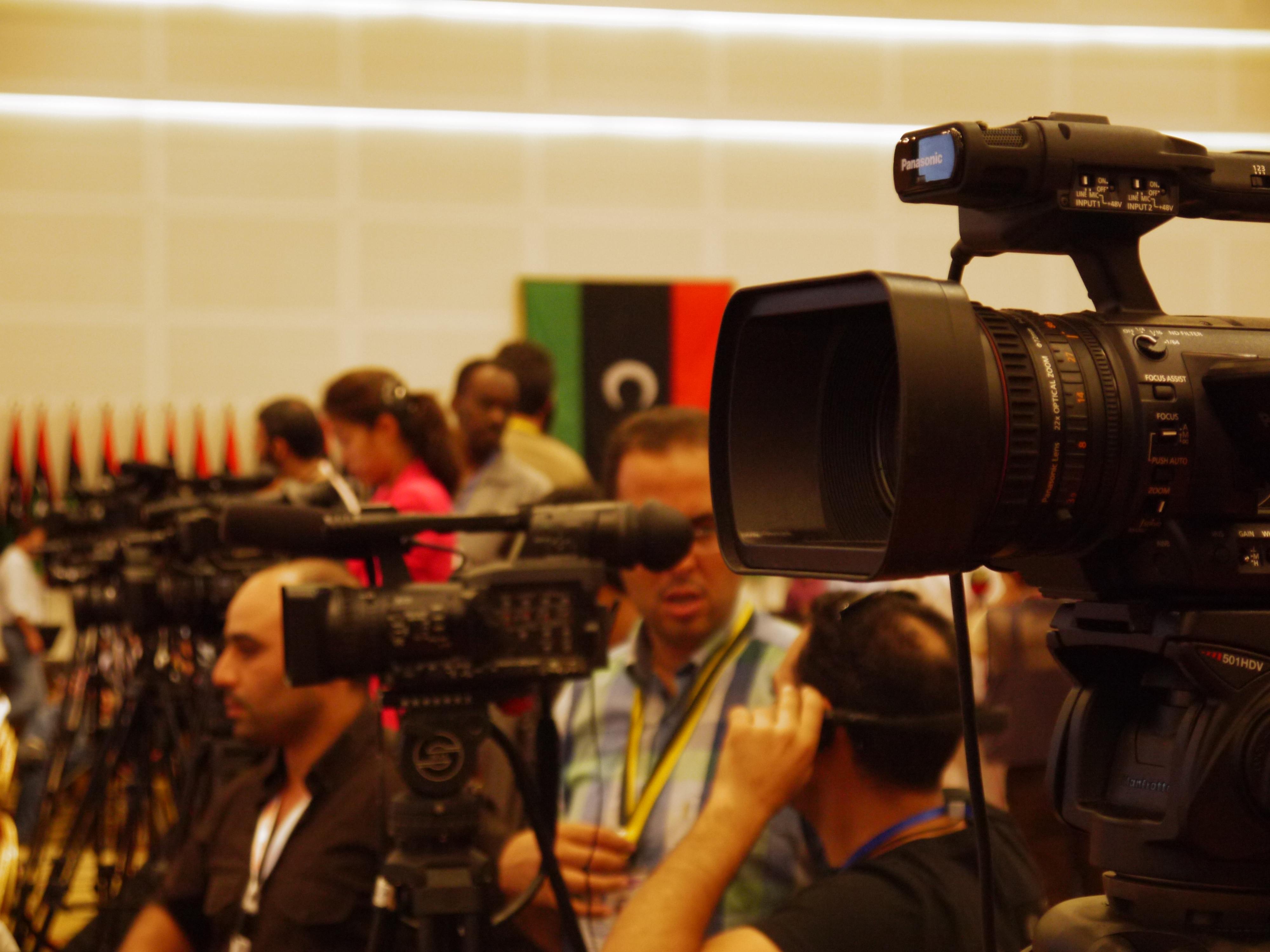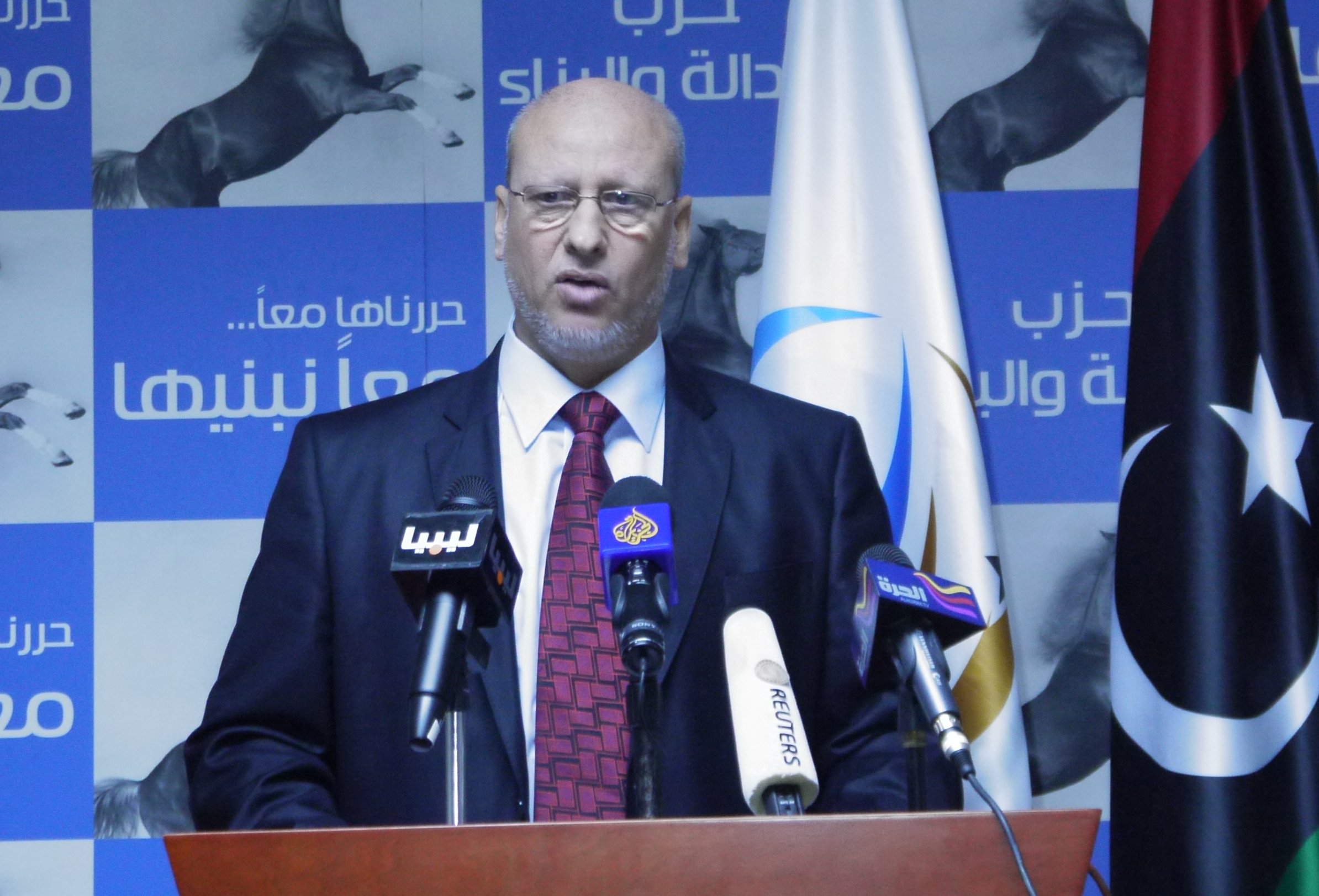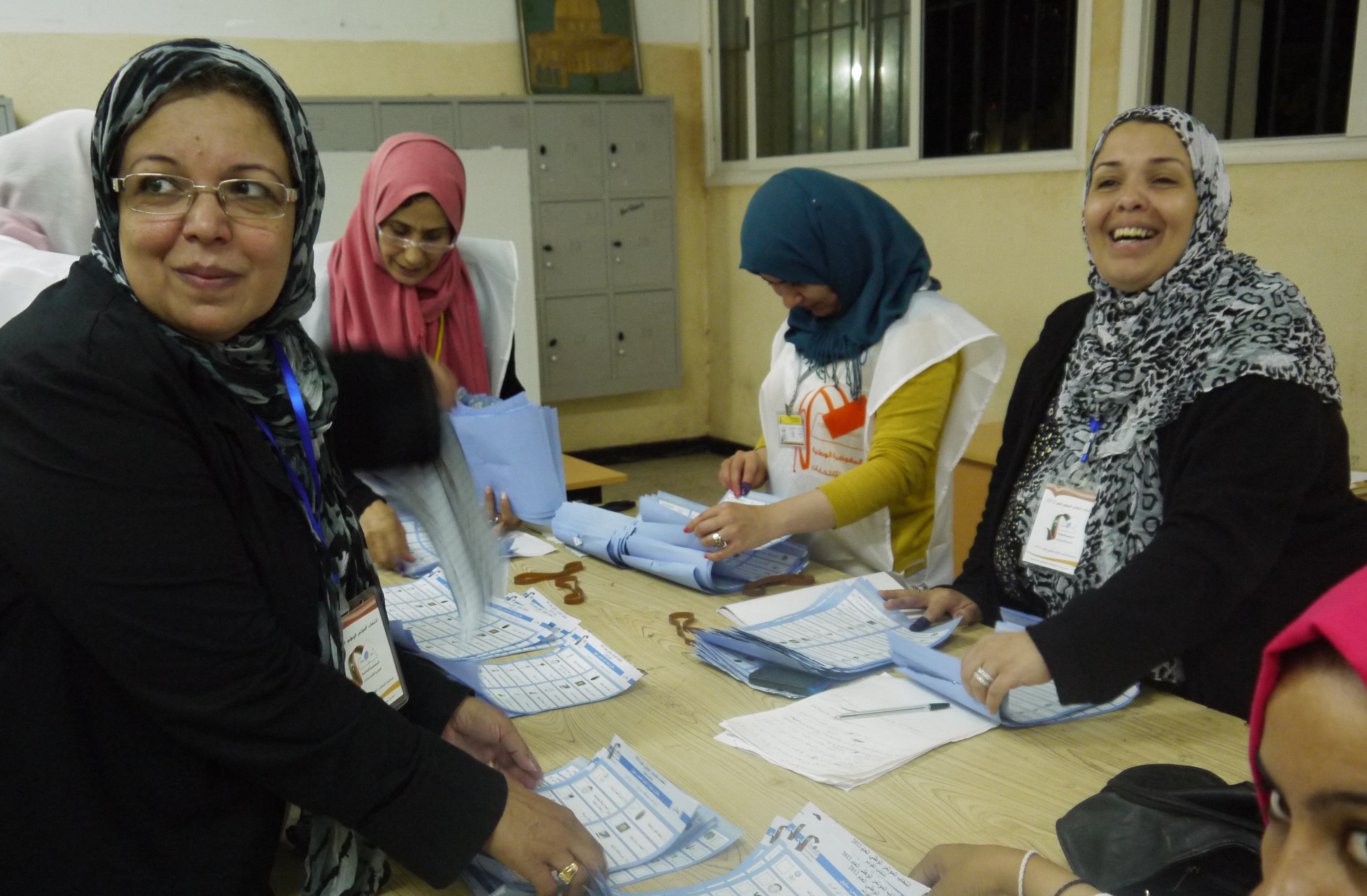By George Grant.
Tripoli, 1 July:
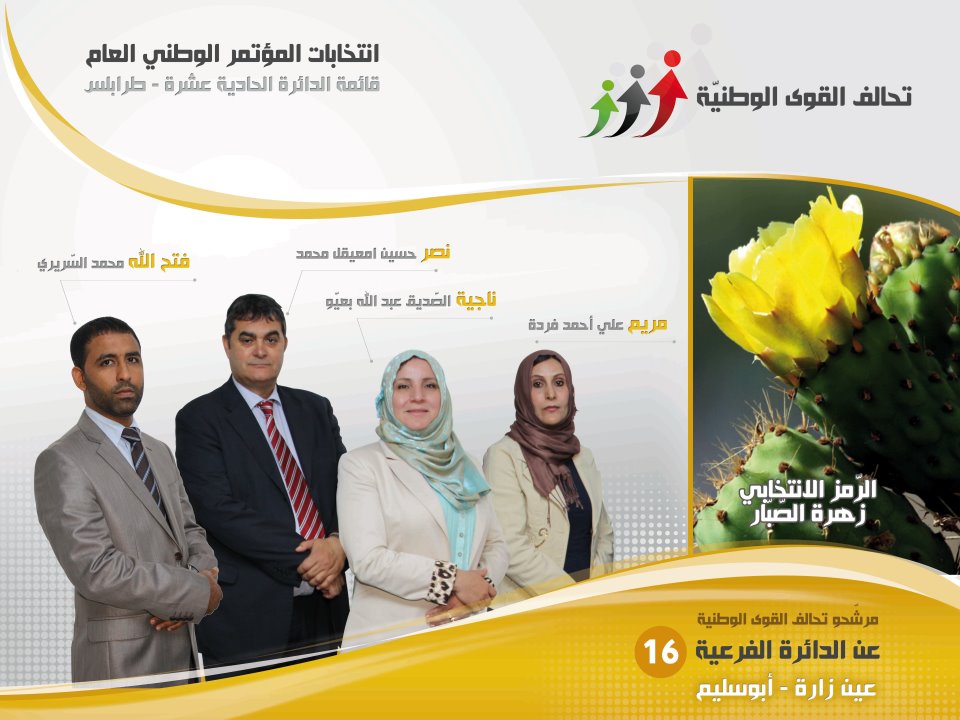
The National Forces Alliance (NFA) is a coalition of 58 political parties supervised by the NTC’s former . . .[restrict]interim prime minister, Mahmoud Jibril. Although technically a political entity and not a party in itself, the NFA is standing as a single body in the 7 July elections.
The NFA is fielding 70 candidates across Libya, making it the second largest grouping after the Justice & Construction Party. Jibril serves as president of the NFA, and his office is comprised of a 12 person team. Faisal Krekshi, a gynaecologist by training, serves as General Secretary of the NFA, the organisation’s executive arm. The executive office is comprised of nine persons.
According to Krekshi, the NFA likes to think of itself as akin to a shadow government, and has teams working across a broad spectrum of policy areas, including healthcare, education, the economy and foreign policy.
The NFA is widely considered towards the more ‘liberal’ end of the political spectrum, but it does not describe itself as secularist. Jibril has said the NFA is a moderate Islamic movement that recognises the importance of Islam in political life and favours Sharia as the basis of the law.
On the economy, the NFA has spoken of the need for a “globalisation strategy”, cognisant of the fact that Libya is part of a globalised international community and cannot afford to operate in isolation.
“We need to encourage foreign investment into Libya for many reasons”, says Krekshi. “The country is underdeveloped in almost every sector, and foreign investment will open new opportunities for the training of young people, who make up 70 per cent of Libya’s population. We can also profit from their presence regarding future exports”.
Krekshi has described Libya as an enormously rich country with huge resources, “not just in oil and gas”. Libya, he say, has “huge amounts of land, a small population, and vast solar and wind-power potential. We are situated on the Mediterranean and we have a rich archaeological heritage suitable for tourism. We could also a major agricultural producer. Especially in the east on the border with Egypt, the soil has some of the highest concentrations of iron in the world.”
The NFA supports privatisation in principle, but emphasises that Libya needs to first focus on rebuilding its shattered infrastructure. “Take the example of Germany”, Krekshi says. “After the Second World War, they started from nothing. Libya needs its own Marshall Plan to develop a proper infrastructure. Then we can talk about privatisation”.
Krekshi has also said that the NFA supports the introduction of a minimum wage, although it has not yet stipulated at what amount this would be set. It also supports implementing a social security system more broadly in Libya.
The NFA is a strong supporter of decentralisation, but does not support federalism for the country. As examples of areas that should fall under the control of local councils, Krekshi cited education, healthcare and transport.
“We would also support a proportion of taxes raised in local areas being returned to local councils to spend as they see fit”, Krekshi says. “This would serve to both incentivise local councils and help local taxpayers to feel tangible benefits from their taxes”.
Additionally, Krekshi has indicated that the NFA would favour the creation special economic zones for towns and cities along Libya’s borders to encourage trade and to maximise their economic potential. “We have to recognise that different towns need different things”, he says. “They cannot all be treated the same way”.
Krekshi has said that Jibril is handling the NFA’s discussions with federalists in eastern Libya, and insists that “preliminary discussions are promising”.
In recent weeks, resentment has been growing in the east of the country over what is perceived as the unjust distribution of seats for the National Conference, and a perception that the authorities in Tripoli have been neglecting regional concerns. There have been growing rumours of a boycott of the elections by some people in eastern Libya if their grievances are not resolved within the next few days, although a widespread boycott remains unlikely.
The NFA has not come to a firm decision on whether to support a parliamentary or presidential system of government when the permanent constitution is created after the elections, but has said – somewhat enigmatically – that it wants to avoid any system which could lead “either to a monopoly on power or political gridlock”.
On the question of justice and reconciliation with former Qaddafi loyalists, the NFA believes strongly that justice must precede reconciliation. “I don’t know why people are creating confusion about this point”, Krekshi says. “You cannot have reconciliation without first having justice. We must establish a justice system that is clear, independent and effective. Once we have that, and justice has been done, then reconciliation can begin”.
Finally, on defence and foreign policy, the NFA favours the development of strong and capable armed forces, and argues that Libya must be pragmatic in its relations with other countries. “There can be no emotion in politics”, Krekshi says. “We must put the interests of Libya first. Definitely, we will be more open to cooperation with those countries who supported us in the revolution, but we will also deal with Russia and China as an interest of the state.” The NFA will also seek constructive relations with all of its regional neighbours, particularly on issues of border security.
With regards to the Israel-Palestine conflict, the NFA’s position is to “support the Palestinian Liberation Organisation (PLO) with whatever decisions they make”.
The National Forces Alliance website can be found at www.nff.ly
George Grant can be followed on Twitter at www.twitter.com/GeorgePBGrant [/restrict]



